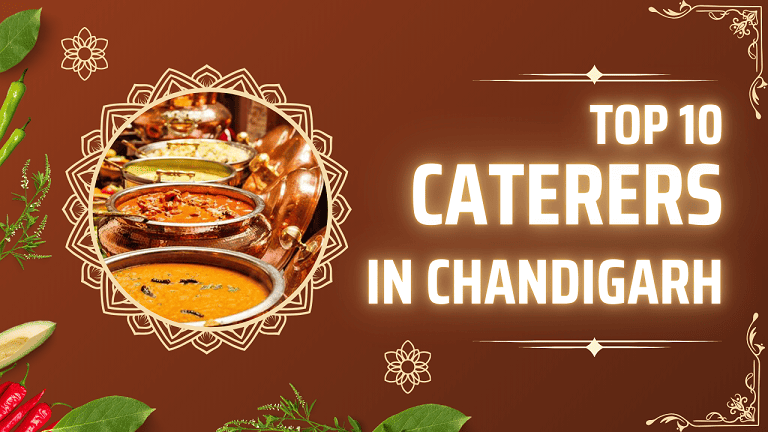Top 10 Caterers in Chandigarh
Caterers in Chandigarh – Caterers are professionals who provide food and beverage services for events, ranging from intimate gatherings to large-scale celebrations.
They play a crucial role in ensuring that guests are treated to delicious meals, drinks, and a seamless dining experience.
Catering services can be tailored to suit any type of event, including weddings, corporate meetings, birthday parties, conferences, festivals, and more.
Types of Catering Services
Wedding Catering: This involves creating elaborate and diverse menus to suit the tastes and dietary preferences of wedding guests. Wedding caterers often offer multi-course meals, buffet options, finger foods, and custom cakes.
Corporate Catering: Catering for business events like seminars, conferences, and corporate lunches. It can range from simple box lunches to elaborate multi-course meals, ensuring guests are well-fed during long meetings or events.
Party Catering: For casual and formal parties, caterers can offer a variety of food options, such as finger foods, appetizers, BBQ, and themed menus to match the party’s style.
Buffet Catering: A popular option for larger events, buffet catering allows guests to serve themselves from a spread of different dishes. It’s ideal for weddings, receptions, or corporate parties where guests may have different tastes.
Plated Catering: A more formal dining option where food is served to guests at their tables. This is typically used for weddings or upscale events that require a more refined dining experience.
Food Truck Catering: For a more casual or unique approach, food trucks offer a variety of street food options and are great for outdoor events, festivals, or casual parties.
Healthy or Specialized Catering: Many caterers now offer specialized services such as vegan, gluten-free, or organic catering to cater to guests with dietary restrictions or preferences.
Menu Customization: Caterers work with clients to create a menu that fits the theme of the event, guest preferences, and budget. This could include cuisine choices, dietary needs, and special requests.
Food Preparation & Serving: Caterers prepare and serve food at the event, ensuring that everything is fresh, beautifully presented, and served at the correct temperature.
Beverage Service: Caterers often provide a wide selection of beverages, including alcoholic drinks for events like weddings, and non-alcoholic options such as mocktails, fresh juices, and coffee.
Staffing: Experienced catering staff members are typically on hand to serve food, clear tables, and ensure that the dining experience is seamless.
Event Setup and Cleanup: Many caterers assist with the setup of dining areas, table settings, and clean-up after the event, leaving the hosts with fewer tasks to manage.
When selecting a caterer for your event, consider the following factors:
Menu Options: Ensure the caterer offers a variety of options that align with your event’s theme and guest preferences.
Reputation and Reviews: Look at customer reviews and testimonials to gauge the quality of their food and service.
Experience: Choose a caterer who has experience in handling the type of event you’re hosting, whether it’s a wedding, corporate gathering, or party.
Budget: Get a clear breakdown of costs, including food, service, and additional charges like setup and cleanup fees.
Tasting Sessions: Many caterers offer tastings before the event to ensure the food meets expectations.
Expertise: Professional caterers bring years of experience and know-how, ensuring that the food is of high quality, well-presented, and served efficiently.
Convenience: Hiring a caterer takes the burden of meal planning, preparation, and serving off the hosts, allowing them to focus on other aspects of the event.
Variety: Caterers offer a wide variety of food choices, from traditional to modern, gourmet to casual, giving you the flexibility to tailor the menu to your event.
Customization: Catering services can be customized to suit your event theme, dietary preferences, and specific requests, ensuring that your event stands out.
Stress-Free Experience: With a professional caterer handling the food, you can focus on enjoying the event with your guests instead of worrying about the logistics.
- Weddings: Multi-course meals, buffets, or plated dinners.
- Corporate Events: Breakfasts, luncheons, and dinner parties.
- Birthday Parties: Casual snacks, finger foods, or themed food stations.
- Festivals & Outdoor Events: Food trucks, casual BBQ, or buffet-style meals.
- Special Celebrations: Anniversaries, baby showers, and graduations.
Caterers are vital to the success of any event, large or small. Whether you’re planning an intimate gathering or a grand celebration, the right caterer ensures that your guests are well-fed, happy, and enjoy the event to the fullest.
From menu customization to full-service dining experiences, hiring a professional caterer adds convenience, expertise, and quality to your special occasion.
FAQ
What happens in catering?
Catering involves preparing and serving high-quality food and beverages for large groups at special events. It aims to enhance occasions by providing memorable culinary experiences. Caterers handle menu planning, food preparation, presentation, and service.
They work closely with clients to customize offerings, manage dietary requirements, and ensure smooth execution. Catering can range from simple buffets to elaborate multi-course meals, often including setup, service, and cleanup.
What are the catering charges?
Catering charges encompass the total cost of food and beverage purchases and associated event expenses. This includes the price of ingredients, preparation, service staff, and equipment rental.
Additional charges may cover special items like upgraded linens, decorations, or custom menu items. Factors influencing costs include event size, menu complexity, service style, and duration. Catering charges are typically outlined in a detailed quote or contract.
What are party food caterers?
They are specialized service providers who prepare and deliver food and drinks for various gatherings, including parties, weddings, and corporate events. They work with clients to develop appropriate menus, from finger foods to full meals.
Caterers handle food preparation, transportation, setup, and sometimes service. They ensure food safety, quality, and presentation while meeting client preferences and dietary needs.
What are the two main types of catering?
The two primary types of catering are on-premise and off-premise. On-premise catering involves preparing and serving food at the event venue, utilizing on-site kitchen facilities.
Off-premise catering requires food preparation at a separate location, then transporting and serving it at the event site. Each type has distinct logistical considerations and equipment needs. The choice depends on venue facilities, event size, and client preferences.
What is the main function of catering?
The primary function of catering is to prepare and serve high-quality food and beverages to guests at events. Caterers must ensure food safety, maintain hygiene standards, and create visually appealing presentations.
They aim to enhance the overall event experience through culinary offerings. Additional functions include menu planning, dietary accommodation, coordinating with event planners, managing staff, and maintaining equipment. Caterers play a crucial role in event success.
What is catering classification?
Catering classification categorizes services into commercial, transport, and welfare sectors. Commercial catering is divided into residential (hotels, motels) and non-residential (restaurants, bars, fast food outlets).
Transport catering serves travelers on planes, trains, and ships. Welfare catering covers institutional settings like schools and hospitals. This classification helps understand different catering contexts, clientele, and operational requirements.
What are the 7 P’s of catering?
The 7 P’s of catering are Product, Price, Place, Promotion, People, Process, and Physical Evidence. Product refers to menu offerings. Price covers cost strategies. Place involves service location. Promotion includes marketing efforts.
People encompass staff and customer interactions. Process refers to service delivery methods. Physical Evidence relates to tangible aspects like presentation and ambience. These elements form a comprehensive framework for planning and executing successful catering services.
What is catering basics?
Catering basics involve providing food and beverage services at remote locations for various events. They include menu planning, food preparation, transportation, setup, service, and cleanup. Caterers must understand food safety, presentation techniques, and customer service.
They also need to manage logistics, staff, and equipment effectively. Catering basics also cover business aspects like pricing, marketing, and client relations. Attention to detail and adaptability are crucial skills.
What is catering costing?
Catering costing refers to calculating the expenses associated with providing food services. It includes the cost of ingredients, labour, equipment, transportation, and overhead. Costing accounts for all items used or consumed, including waste or theft.
Accurate costing is crucial for pricing services, managing profitability, and making informed business decisions. It helps caterers balance quality with affordability and ensures sustainable operations.
How do you calculate catering food costs?
To calculate catering food costs per person, first determine the total ingredient costs for the event menu. Then, divide this total by the number of guests attending. This provides the essential food cost per person.
When setting final prices, additional factors like labour, overhead, and profit margin should be considered. Accurate ingredient measurement and portion control are crucial for maintaining consistent food costs across events.
Thanks for visiting – Chandigarh News



